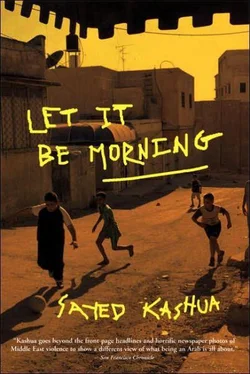My younger brother wants to know how the Communists reacted, and for a moment he’s taken aback at his own question, but Father hardly notices and says that they objected at first, of course, because we’re all one nation after all, but then they agreed too. And they weren’t the only ones. “In the end, the decision was unanimous. Even the Islamic Movement agreed. Besides, what’s the worst that could happen to them? If there were any who were wanted, they’d be detained, but they’d have been detained sooner or later anyway, in one of the raids. The ones who’d merely come to work would be taken back to their own villages. It’s not as if we’re pushing them into prison. Believe me, within two days they’ll all be back here as if nothing happened.”
We finish eating and there’s a lot of meat left. Mother says it’s a shame, and that if we want any more food today, we should come back.
Igo home with my wife and daughter. My wife says it’s not right to hand the workers over, that they have it so tough and that every time she sees them she feels sorry for them. The villagers have no compassion, do they, as if they don’t have little children of their own and families to feed. What are they supposed to do now? Starve to death? My daughter goes back to sleep. My wife gets into bed and announces she’s going to sleep for an hour or so, if she can possibly fall asleep at all in this heat with no air-conditioning. She says that if handing over the workers means we’ll be able to turn the air conditioner back on, she’s in favor, and she laughs. She doesn’t take things seriously enough. Sometimes I envy her for the way she just accepts everything, just takes things for granted. In truth, nothing ever fazes her. She behaves as if everything is just going to be okay, and I realize there’s no way I’ll ever be able to share my anxieties with her. I’m sweating and I feel sticky. For a moment I consider getting in the bath, but I decide to wait. Mustn’t waste water now. When I urinate, I don’t even flush the toilet.
My wife falls asleep very quickly. I lie in bed beside her, my arms folded under my head and my eyes glued to the ceiling. I hear Farres, our neighbor. His voice has changed a little over the years, but I can still recognize him calling his children’s names. Farres has an unusual accent, unlike that of most of the people in our village, and his family name is unusual too, but everyone refers to him as Farres the Ramlawi because his family came from Ramla. I’d heard not long ago that Farres had married a girl from Qalqilya and that he’d left Ibtissam. They hadn’t actually gotten a divorce, but she didn’t want to see him anymore.
I could hear Ibtissam, his wife, screaming at him to get the hell out of there. “What are you doing here, you piece of shit? Go back to your bitch.” And Farres, with his accent, shouts that he wants to see his children. “I don’t want to come in, just let me see them. I just want to see they’re okay.”
“Get the hell out of here. Nobody wants to see your face around here. Beat it before I call the police,” Ibtissam yells.
Farres is calling his children by name now. “Muntassar, Haibbah.” But they don’t answer. Only Ibtissam keeps screaming and swearing at him.
When we were little, every now and then a whole family would descend on the village. All of their children would talk with strange accents, and suddenly, in the middle of the year, a new boy or girl would join our school, and we, the students, never liked them, those kids who talked funny. The teachers didn’t like them very much either. In fourth grade we got this kid from Um el-Fahm. Everyone referred to him as Fahmawi . When we were in middle school, there was a girl from Lydda. We called her Lydduya . These kids always hung out together and almost never exchanged a word with anyone else at school.
Everyone said it was the police that had brought them to the village. The Fahmawi, for instance, was said to be the son of a murderer, who’d killed someone in Um el-Fahm and was serving time. The police had moved the whole family because of the risk that someone would try to take revenge. When it came to the girl from Lydda they said her father was a drug dealer who had squealed to the police, so that people in Lydda were out to get him, and that was why the whole family had been moved to our village.
We knew we ought to be careful when it came to people with strange last names. Even our teachers always said that the police had forced the school to accept those kids. Otherwise they’d never have been admitted. Once the history teacher really screamed at the Lydduya, said they should just have stayed where they were, to die in Lydda, instead of being brought here to ruin our own children. The teacher said she was like a rotten tomato in a barrel, spoiling all the others. The whole class stared at the Lydduya, who was sitting on her own in the last row, standard procedure for the nonlocals. She burst into tears and clutched her head with both hands, but nobody took pity on her, even though she was a good student and was never out of line in class.
Farres the Ramlawi must be forty by now. He’s been in the village for over fifteen years but he still speaks with a Ramlawi accent. I was in my second year in middle school when I heard his name for the first time. My parents were discussing the fact that our neighbor Ibtissam was going to marry the Ramlawi. I remember my mother was actually pleased, because maybe someone might get Ibtissam to pipe down. Ibtissam was quite old by then, over twenty-five, and everyone was sure nobody would ever marry her. Everyone said she was a little bit mad. She was forever fighting with the neighbors. My parents didn’t really like her but they were always nice to her, to make sure she didn’t throw any garbage at us or chop down the trees in our yard like she did to the other neighbors. She must have had about seven siblings, and they were all married by then. She had stayed on with her elderly father, who was wheelchair-bound and spent his time cursing the kids playing soccer across from their house. And however old he was, he was really strong and knew how to move fast in his wheelchair. We did whatever we could to keep our balls from falling in his yard, because he always sat outdoors, cursing and waiting for the balls, and when one did fall in his yard, he’d spring like a snake, wheelchair and all, lunging at the ball, clutching it in his arms, cursing and laughing gleefully, then go into the house to get a knife, and come up close to us to make sure we saw him rip the ball to shreds before handing it back.
Everyone hated him. He was the reason we weren’t allowed to play ball outdoors at all, because somehow, sooner or later, the ball would land in their yard. Once, Khalil, our neighbor’s son, tried to chase his ball after it fell into Ibtissam’s father’s yard. It was a new ball and Khalil said his father would kill him if he lost it. He ran as fast as he could, but no one could outrun the old man’s wheelchair. Khalil didn’t give up, despite the old man’s screams, and jumped on him, crying, and struggled to prize the ball out of his arms. The old man wouldn’t let go. He laughed in Khalil’s face and promised to slash the ball with a knife. Khalil pulled at the ball with all his strength, and the old man fell out of his wheelchair and landed on the ground. Khalil, who had salvaged his ball, ran home. None of us dared approach the old man, who was crying uncontrollably, because we were afraid he’d beat us or stab us with his knife. He stayed there, on the ground, next to his overturned wheelchair, until Ibtissam got home and lifted him up. That day, she cursed everyone, and after her father told her it was Khalil who was to blame, she spent the next few hours swearing at him and his parents, then shattered their windows with big stones and promised to kill them unless they gave her father the ball. All of the neighbors tried to intervene and to get Ibtissam to let it go, but it was no use. In the end, Khalil’s parents brought Ibtissam’s father the ball. Khalil wept like a baby and promised that someday he would kill the bitch Ibtissam and her father, who ought to be dead anyway.
Читать дальше












